New research shows major efforts needed to enhance women's representation in Pakistan's civil service
Date:
Islamabad, Pakistan — Despite the country's favourable domestic legal framework and its international obligations, most of Pakistan's female civil servants are stuck at the bottom ranks of the bureaucracy because of sexist social attitudes, a new United Nations study has found.

Gender Equality in Public Administration/2017: Pakistan Case Study was jointly released today by United Nations Development Programme (UNDP) and UN Women.
The study, done under UNDP's global Gender Equality in Public Administration initiative, will be used to support the Government of Pakistan and its development partners to make evidence-based programmes to address barriers to gender equality in public administration.
Despite significant progress in recent years, only one in four Pakistani women currently participate in the labour force, "meaning that there is a vast treasure trove of talent unutilized", said Naoko Takasu, Deputy Country Director of UNDP Pakistan.
"As one of the largest wage employers in the country, the public sector is an important entry point for women," she said at the report launch ceremony. "Enhancing women's role in leadership and decision-making will thus have an immense impact on gender equality and on Pakistan's successful achievement of the Sustainable Development Goals."
Said UN Women Country Representative, Jamshed Kazi: "In taking forward the Beijing Platform of Action, Pakistan is committed to achieving 30 percent representation of women in leadership positions. This case study shows that to achieve meaningful representation of women at all levels of decision-making requires concentrated action that acknowledges and addresses the barriers they face."
In addition to committing to the Beijing Platform for Action and the Sustainable Development Goals, both United Nations agreements, Pakistan also maintains a quota to support women's entrance into the civil service and affirmative action policies in its Federal Public Services Commission, which selects bureaucrats for Government agencies.
However, the new study said that "while promotions are based on years in service, gender stereotyping and social norms come into play at the time of postings for the civil servants with the concentration of women civil servants being at entry level."
"The challenges that women in Pakistan face are entrenched societal attitudes relating to women despite international obligations and constitutional provisions," it said.
The study said that making policies to increase women's access to decision-making posts requires "a multi-faceted approach looking at the socioeconomic realities of women's lives".
It recommended:
- Developing systematic, real-time monitoring and reporting of women's participation and access to decision-making across all Government units
- Improving the ability of key Government institutions to ensure gender mainstreaming in all Government agencies, including with regard to budgeting
- Strengthening coordination between the Ministry of Planning, Development and Reform and the Ministry of Human Rights to promote women's empowerment
- Building a more supportive environment for female civil servants by facilitating women's networks within the civil service and engaging with other developing countries and applying the lessons they learned
The Pakistan study is one of 15 in-depth case studies on women in the civil service conducted around the world with UNDP support. It was done using a new methodology developed in collaboration with the Organisation for Economic Cooperation and Development and explores women's representation and access to decision-making roles and their perceptions of barriers and opportunities, and proposes policy and programmatic interventions.
For more information:
UNDP:
Fatimah Inayat
Communications Analyst
Email: [ Click to reveal ]
UN Women:
Faria Salman
Head of Communications, Strategic Management & Partnerships Unit
Email: [ Click to reveal ]